THE ROOKIES - SEASON 2: Social Progressives Like Cop Shows, Too
If you think cop shows were just a way for network t.v. to reinforce the status quo, think again. In the 1970's, smart producers were looking to appeal to viewers beyond the traditional law-and-order fanbase of the cop show. As a result, such shows implemented more realistic portrayals of police procedures as well as attempting to deal with challenging themes that were relevant to the times.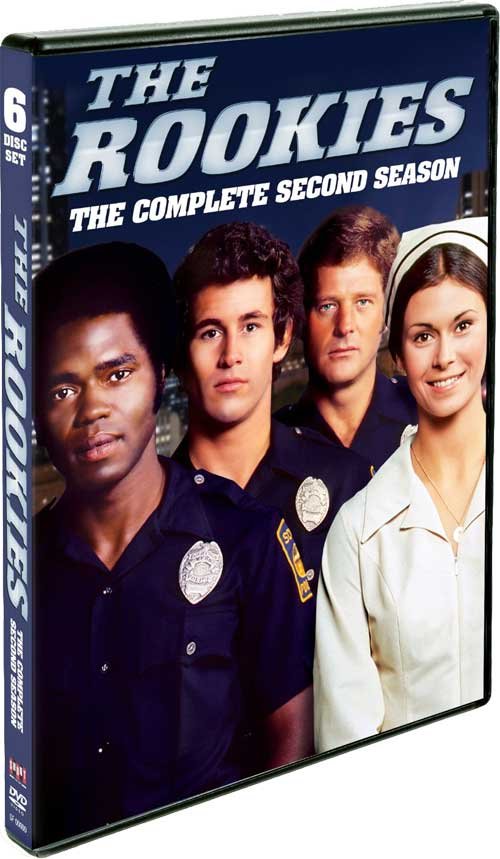 A particularly fascinating example of these trends can be found in The Rookies, an Aaron Spelling-Leonard Goldberg production that enjoyed a successful four year run between 1972 and 1976. This show took part of its inspiration from police programs designed to bring in younger and more racially varied recruits into departments across the country.Thus, The Rookies is built around three young recruits from such a program who are adjusting to life as cops on the beat. Willie Gillis (Michael Ontkean) is a young, liberal white kid with a strong socially progressive streak. His partner and roommate is Terry Webster (Georg Stanford Brown), a black officer who is as intelligent as he is streetwise - and very prone to challenge procedure if he thinks it is outdated or ineffective.
A particularly fascinating example of these trends can be found in The Rookies, an Aaron Spelling-Leonard Goldberg production that enjoyed a successful four year run between 1972 and 1976. This show took part of its inspiration from police programs designed to bring in younger and more racially varied recruits into departments across the country.Thus, The Rookies is built around three young recruits from such a program who are adjusting to life as cops on the beat. Willie Gillis (Michael Ontkean) is a young, liberal white kid with a strong socially progressive streak. His partner and roommate is Terry Webster (Georg Stanford Brown), a black officer who is as intelligent as he is streetwise - and very prone to challenge procedure if he thinks it is outdated or ineffective.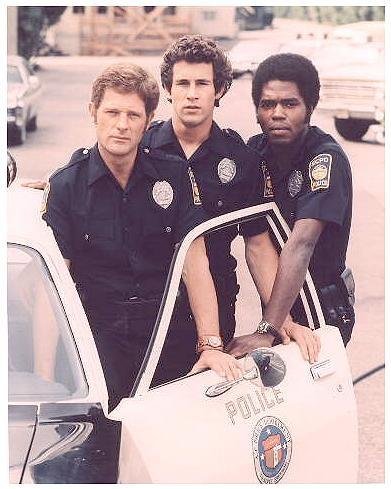 Mike Danko (Sam Melville) is the third and most traditional member of the trio, a young Air Force vet with a pretty nurse wife named Jill (a pre-Charlie's Angels Kate Jackson). All three young cops are managed by Lt. Ryker (Gerald S. O'Loughlin), an old-school cop who is gruff about police work yet caring and open-minded enough to provide thoughtful counsel for his three youthful charges.By the time The Rookies reached its second season, it had developed a formula that defined the structure of most episodes: a crime or similar incident would provide the main plot for a particular episode and that would dovetail with an exploration of a particular social issue that would be just as important to the episode as the actual main plot.
Mike Danko (Sam Melville) is the third and most traditional member of the trio, a young Air Force vet with a pretty nurse wife named Jill (a pre-Charlie's Angels Kate Jackson). All three young cops are managed by Lt. Ryker (Gerald S. O'Loughlin), an old-school cop who is gruff about police work yet caring and open-minded enough to provide thoughtful counsel for his three youthful charges.By the time The Rookies reached its second season, it had developed a formula that defined the structure of most episodes: a crime or similar incident would provide the main plot for a particular episode and that would dovetail with an exploration of a particular social issue that would be just as important to the episode as the actual main plot.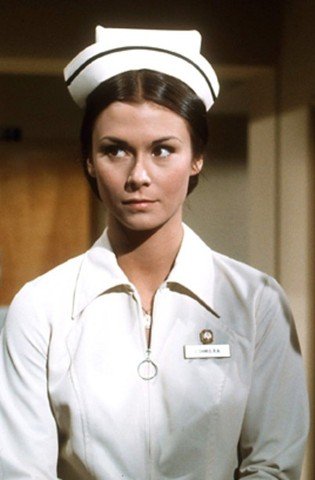 For example, the episode "Prayers Unanswered, Prayers Unheard" uses a premise where a killer seems to be targeting members of the clergy as a way to explore the relevance of religion to modern, urban ways of thinking. "Frozen Smoke" is another clever example of this technique, in which a series of everyday incidents - a child disappearing, a fight between two teens prompting an accidental fatality - serves as a backdrop to Gillis questioning whether or not his role as a cop has any meaningful impact.However, despite its social-lesson orientation, The Rookies isn't above putting traditional cop show thrills front and center. For example, "Get Ryker" is a fun episode in which an aging con (Joseph Campanella)
For example, the episode "Prayers Unanswered, Prayers Unheard" uses a premise where a killer seems to be targeting members of the clergy as a way to explore the relevance of religion to modern, urban ways of thinking. "Frozen Smoke" is another clever example of this technique, in which a series of everyday incidents - a child disappearing, a fight between two teens prompting an accidental fatality - serves as a backdrop to Gillis questioning whether or not his role as a cop has any meaningful impact.However, despite its social-lesson orientation, The Rookies isn't above putting traditional cop show thrills front and center. For example, "Get Ryker" is a fun episode in which an aging con (Joseph Campanella) 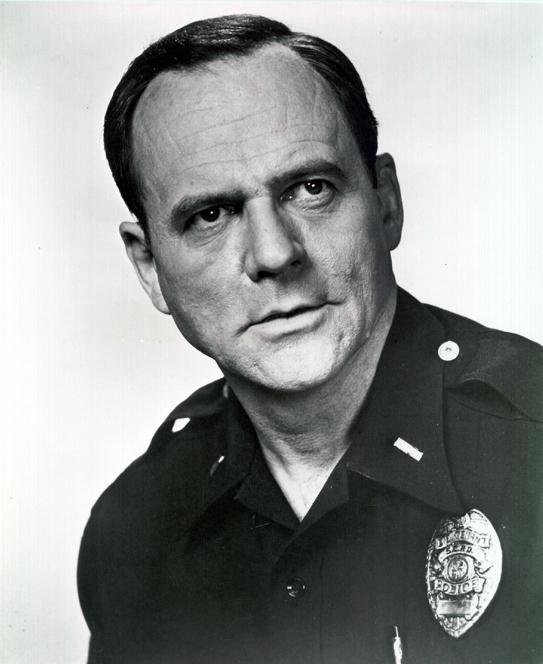 who is fresh out of prison comes gunning for the Lieutenant. Social concerns are backgrounded in this episode in favor of exploring the character of Ryker, with O'Loughlin turning in a strong but controlled performance as he is forced to reveal his personal life to the young officers. "Cauldron" is another gem in this area, built around a plot where a dying criminal (John Saxon!) kidnaps Willie and Terry and leaves them in the desert to fend for themselves. The friendship between Willie and Terry is the focus but there's also an interesting sub-theme of the importance of hope in surviving dangerous situations.The resulting show had a tendency towards preachiness but it also had a big heart. More importantly, the ability to blend important, sincerely explored social themes with likeable characterizations is what
who is fresh out of prison comes gunning for the Lieutenant. Social concerns are backgrounded in this episode in favor of exploring the character of Ryker, with O'Loughlin turning in a strong but controlled performance as he is forced to reveal his personal life to the young officers. "Cauldron" is another gem in this area, built around a plot where a dying criminal (John Saxon!) kidnaps Willie and Terry and leaves them in the desert to fend for themselves. The friendship between Willie and Terry is the focus but there's also an interesting sub-theme of the importance of hope in surviving dangerous situations.The resulting show had a tendency towards preachiness but it also had a big heart. More importantly, the ability to blend important, sincerely explored social themes with likeable characterizations is what 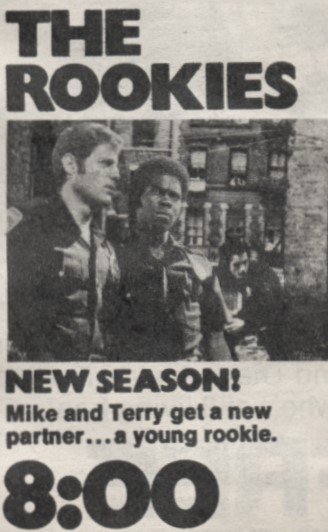 makes The Rookies work - and a key part of making those elements play well lies in the strong performances. Ontkean is charming as a wide-eyed, liberal type who's seeking the answers and Brown balances him out as an equally progressive but more guarded and cynical variation of that characterization.Melville plays a more traditional young leading man type well, underplaying his role in general but bringing in bigger emotional expressiveness when the situation demands it. Jackson makes a good-natured foil to the cops and her relationship with Danko adds to the personal drama side of things, particularly in "A Matter Of Justice," in which an unforeseen tragedy puts Jill and Mike's relationship to the test. Jackson has to give a very serious dramatic performance in this episode and she delivers it with both skill and surprising intensity.
makes The Rookies work - and a key part of making those elements play well lies in the strong performances. Ontkean is charming as a wide-eyed, liberal type who's seeking the answers and Brown balances him out as an equally progressive but more guarded and cynical variation of that characterization.Melville plays a more traditional young leading man type well, underplaying his role in general but bringing in bigger emotional expressiveness when the situation demands it. Jackson makes a good-natured foil to the cops and her relationship with Danko adds to the personal drama side of things, particularly in "A Matter Of Justice," in which an unforeseen tragedy puts Jill and Mike's relationship to the test. Jackson has to give a very serious dramatic performance in this episode and she delivers it with both skill and surprising intensity.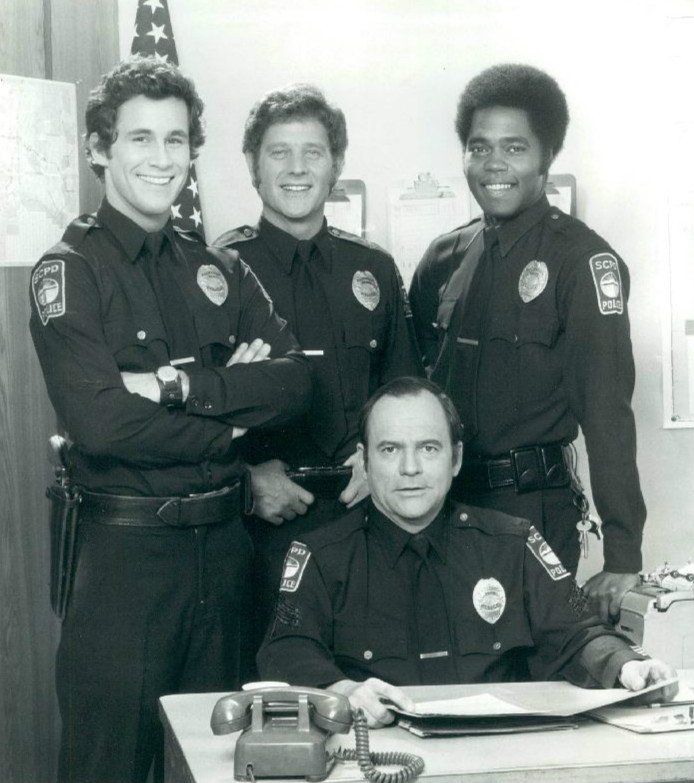 However, just as much praise should go to O'Loughlin, who does the subtlest yet most demanding work here. His character is the voice of reason, providing a procedural "devil's advocate" to the less traditional impulses of the younger officers. He makes a worthy foil, reinforcing the legal, pragmatic side of things while also showing an ability to care. He also employs a dry, droll delivery to his dialogue as he reins in the rookies and the writers are careful to give him crisp, slyly humorous dialogue. As a result, his scenes are always something to look forward to in an episode instead of just a device for exposition.In short, The Rookies Season 2 is a good example of how the cop show formula shifted during the 1970's and well-crafted, skillfully acted fun for fans of the genre. If you want an alternative to the usual small-screen shoot-'em-up fare, this show fits the bill nicely.
However, just as much praise should go to O'Loughlin, who does the subtlest yet most demanding work here. His character is the voice of reason, providing a procedural "devil's advocate" to the less traditional impulses of the younger officers. He makes a worthy foil, reinforcing the legal, pragmatic side of things while also showing an ability to care. He also employs a dry, droll delivery to his dialogue as he reins in the rookies and the writers are careful to give him crisp, slyly humorous dialogue. As a result, his scenes are always something to look forward to in an episode instead of just a device for exposition.In short, The Rookies Season 2 is a good example of how the cop show formula shifted during the 1970's and well-crafted, skillfully acted fun for fans of the genre. If you want an alternative to the usual small-screen shoot-'em-up fare, this show fits the bill nicely.


